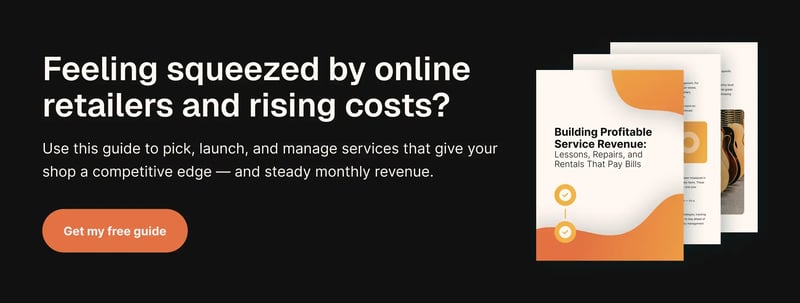
Managing a school music rental program can often feel like a constant juggling act.
Picture this: a stack of paper contracts on the verge of falling, a spreadsheet open with countless rows of instrument serial numbers and due dates, and your phone ringing off the hook with parent inquiries about payments and repairs.
You’re trying to track instruments, handle incoming and overdue payments, coordinate with parents and schools, and still make time for all your other responsibilities. The work just keeps growing, and the potential for errors and missed information is high.
But what if there were a way to streamline your processes, freeing you from the daily grind and allowing you to focus on what truly matters? The right system can transform this chaotic juggling act into a smooth, efficient operation, making your life — and the lives of your customers — significantly easier.
Let’s dive into the specific challenges you face as a music store owner and how an automated solution can help control the chaos of running a school rental program.
The Real Challenges Behind School Rental Programs
Running a successful school rental program extends beyond distributing instruments — it involves a detailed process with several critical steps:
- Instrument tracking: Managing which instruments go to which students can be overwhelming, especially across multiple schools.
- Damage assessment and fees: Accurately assessing damage and calculating fees adds another layer of complexity, requiring diligent tracking and follow-up.
- Coordination with band directors: Effective communication is necessary for scheduling deliveries and handling mid-semester dropouts and new additions.
- Collecting monthly payments: Relentlessly chasing payments and addressing late fees can consume valuable staff time and resources.
The solution to complex school music rentals is using an integrated rental system within your POS. A modern, all-in-one platform gives you unified data management, simplifying your customer experience. It lets you control your inventory in real time to prevent overbooking and to optimize your stock. An integrated system also automates billing and reporting, reducing errors and providing valuable insights.
Related Read: 5 Tips for Managing Instrument Rental for Schools
Overcoming Seasonal Workflow Obstacles
For music shops, the rhythm of the school year brings its own set of hurdles that need smart planning and flexibility. Every season has specific needs, from back-to-school preparations to the detailed spring stock check.
Handling these seasonal tasks well is key to keeping things running smoothly and making sure students and teachers always have the instruments they need.
Here are a few obstacles you may need help with:
- Back-to-school rush: Implement an automated rental system to quickly process new contracts and manage inventory efficiently during high-volume periods.
- Summer preparation: Schedule off-season maintenance and repairs, and use inventory management software to track instrument status as you clean and prepare for the upcoming academic year.
- Holiday break returns: Offer flexible return options and communicate clear deadlines, leveraging your automated system to track instruments and minimize disruptions for students.
- Spring inventory review: Use a robust inventory system to perform accurate counts and identify upcoming needs for replenishment during your seasonal check.
- Damaged instrument replacement: Maintain a readily available stock of common replacement parts and a network of reliable repair technicians to ensure quick turnaround and keep students’ learning on track.
When you put efficient systems in place and react quickly to changing demands, you can turn these tough spots into chances to grow and keep your customers happy.
Mastering Parent Communication
Good communication with parents is important for a smooth music rental program, but it can be tricky. You’re fielding payment questions, handling damage disputes, and making sure everyone knows how to take care of their instruments.
Plus, figuring out when to pick up or drop off rentals — and making sure swaps go smoothly mid-year — takes a lot of effort.
These are some of the parent communication challenges your music store might face:
- Payment inquiries: Implement an online portal where parents can view payment statuses and due dates, and securely pay online — significantly reducing call volume.
- Instrument care instructions: Provide readily accessible digital resources, such as a dedicated FAQ page or short video tutorials, to guide parents on proper instrument care and maintenance.
- Damage disputes: Outline your damage policy and resolution process clearly in the rental agreement, and offer a transparent online submission form for damage claims to foster trust and streamline resolutions.
- Pickup and delivery coordination: Use an automated scheduling system that allows parents to book convenient pickup and delivery times, and send automated reminders to minimize missed appointments.
- Mid-year instrument switches: Simplify the process of returning the current instrument and receiving a new one to ensure a smooth transition as students progress.
If you can handle these communication issues well, you build stronger relationships with families.
Simplifying Fees & Payments
For music rental programs to stay profitable and run efficiently, effective financial management is essential. You need clear revenue details from each rental to make sure every instrument is earning you money.
Tracking your accounting — including deposits, monthly payments, damage fees, and early return credits — can be a challenge and requires a reliable system. On top of that, managing families who rent multiple instruments means having a billing process that’s both accurate and easy to use.
Here are some of the transaction fees an automated system can help you monitor closely:
- Deposits vs. monthly payments: Automate the tracking of different payment types to ensure accurate accounting.
- Damage fees and collections: Set up an efficient system for managing assessments and collections to prevent financial losses.
- Early return credits: Use automation to accurately calculate and apply credits for early returns.
- Multi-child family account management: Simplify billing for families with multiple rentals through integrated account management features.
By using smart financial tracking, you can cut down on mistakes, save more money, and give customers a hassle-free experience.
Related Read: Improve Music Store Profit Margins: 5 Tips & Tools
Music Shop 360: Your Rental Management Solution
Music Shop 360 is designed to alleviate these pain points through a comprehensive solution:
- Automated school rental management: The system centralizes all rental data, making it easy to track instruments, students, and contracts from a single dashboard.
- Parent communication tools: Integrated tools allow for payment reminders, accessible instrument care instructions, and streamlined communication channels, cutting down on “Is my payment late?” calls.
- Contract tracking with payment schedules: Clearly defined payment schedules and automated billing help ensure timely collections and reduce the need for constant follow-up.
- Damage documentation: Easily document and track instrument damage to facilitate accurate assessments and fair fee applications.
- Reporting for rental program profitability: Gain clear insights into your rental program’s financial performance, helping you make informed decisions to maximize profitability.
The convenience and efficiency offered by an all-in-one system like Music Shop 360 allows you to focus on your passion for music rather than getting bogged down in administrative tasks.
Schedule a demo to see how our system can simplify your rental process.







